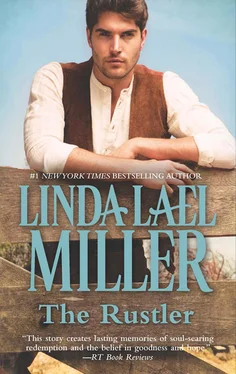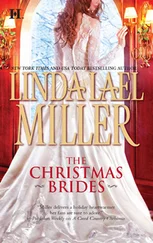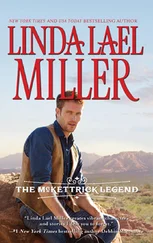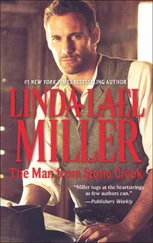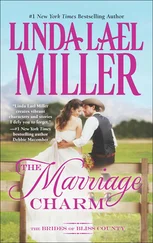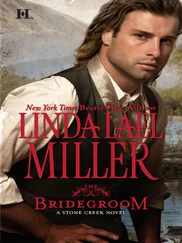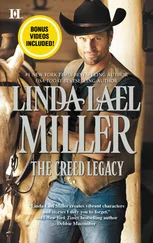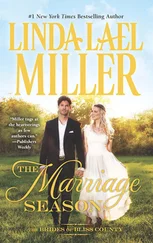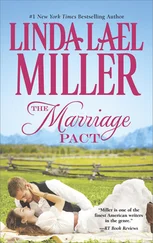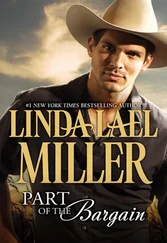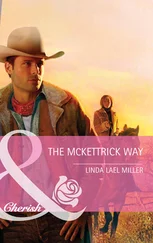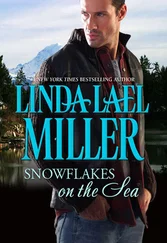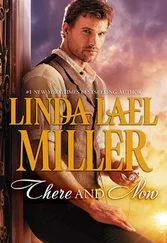“Let’s get this done,” Wyatt answered, and rode in closer to the herd.
The wind picked up, howling over the bare Arizona desert like a banshee on the prowl for fresh corpses, but the gang, six of them in all, got the critters moving in a southerly direction. Wyatt watched Billy and his four riders even more closely than the cattle, making sure none of them had a clear shot at his back.
They funneled the herd through a narrow wash, raising dust so dense that Wyatt pulled his bandanna up over his nose and mouth and blinked to clear his eyes.
He thought about his brother as he rode. Rowdy, a former member of the infamous Yarbro gang, just as he was, had managed to set his feet on the straight and narrow path. He’d changed his ways, gotten himself a pardon, and now he not only had a wife and a new baby, he wore a star on his vest.
Despite the brewing storm, and his own uneasy feelings, Wyatt grinned wryly behind his bandanna. Rowdy, the erstwhile train robber, a lawman. That just proved what he’d always known: life was unpredictable as hell. Right when a man thought he had it all worked out in his brain, it would twist like a rattler striking from the woodpile.
Wyatt had never known any other way of living than holding up trains. Neither had Rowdy, until they pinned a badge on him and made him marshal of Stone Creek, Arizona. Soon after that, Rowdy had met and married a schoolmarm named Lark Morgan.
While he envied Rowdy a little—what would it be like to settle down with a good woman and a community of friends?—Wyatt wasn’t entirely convinced the change would stick. Once an outlaw, always an outlaw, as Pappy used to say.
And Pappy had been in a position to know.
Wyatt felt a mingling of irritation and sorrow as he thought of his father. If he’d been standing over the old man’s grave at that moment, he wouldn’t have known whether to weep or spit on the headstone.
He was debating the virtues of one approach over the other when a second bolt of lightning struck, this time in the center of the herd. Eerie light illuminated the whole scene—the terrified cattle and the other men stood out in sharp relief against the darkness for a long, bluish-gold moment—and then all hell broke loose, exploding in every direction like dynamite tossed into a campfire.
Wyatt’s horse reared, shrieking with panic, and nearly threw him.
He caught the scent of scorched flesh. Cattle bellowed in fear, and the other riders scattered, fleeing for their lives.
The paint gelding wheeled in the midst of hoof-pounding chaos, and though he fought to stay in the saddle, Wyatt found himself rushing headlong for the ground. The wind knocked out of him by the fall, he lay there in the dirt, blinded by dust, and waited to be trampled to death.
Cattle pounded past him, shaking the earth itself.
He didn’t know where his horse was—he couldn’t see anything—but he supposed the poor critter was already dead. If the horns hadn’t gotten old Reb, the hooves would have.
Wyatt managed to roll onto his belly, raise himself onto his hands and knees. It was a shame he wasn’t going to survive the stampede, because it would have made a hell of a story.
The cattle continued to rush past him, spilling around some shadowy barrier. Amazed at his own calm—the whole thing might have been a yarn spun by some old geezer in a saloon—Wyatt felt his way forward and came up against the side of a dead steer. Ducking low, he felt the sharp edge of a hoof brush his right shoulder, but the crushing pain he’d expected never came.
He huddled close to the dead cow and waited it out, praying his horse hadn’t suffered. Reb was a good old cayuse, deserving of green pastures and peace. He should have died with fresh grass between his teeth, not in the middle of a stampede.
Lightning lit up the landscape again, and then again, and Wyatt saw more dead cattle around him. He began to think he might make it after all, but he didn’t catch a glimpse of Billy or the others, and he was still fretting for the horse.
Gradually, after what seemed like the better part of a politician’s oration at a Fourth-of-July picnic, the din subsided and the ground stopped quaking.
Breathing slowly and deeply, Wyatt waited another few moments before daring to get to his feet. Eyes full of dirt, he wiped his face hard with the bandanna, then threw it aside.
He gave a low whistle, more out of habit than any hope that Reb would come.
But he did. The gelding nudged Wyatt between the shoulder blades, nearly knocking him off his feet, and nickered companionably.
Overjoyed, figuring he must be imagining things, Wyatt turned.
And there was Reb, reins dangling, bleeding where a horn had nicked him on the right side, and coated in red Arizona dust.
His heart swelling in his throat, Wyatt swung up into the saddle.
Pistol shots punctured intermittent rumblings of thunder, now distant, like the cattle.
Maybe Billy and his gang were trying to turn the herd.
Maybe a posse was making its presence known.
One way or the other, Wyatt Yarbro had seen the light.
He reined Reb to the north and made for Stone Creek.
CHAPTER ONE
IT MIGHT HAVE BEEN the suffocating heat that had Miss Sarah Tamlin thinking of perdition—though of course three days of endless sermons had to be a factor—and how she’d almost certainly wind up there one day, as she pounded out the wheezing refrain of “Shall We Gather at the River” for a sweltering congregation. Seated at an organ hauled into Brother Hickey’s big revival tent in the bed of a buckboard, Sarah endured, perspiring, longing to fan herself with her sheet music or brush away the damp tendrils of hair clinging to the sides of her neck.
Every year in August, sure as the hay harvest, Brother Hickey and his roustabouts descended on the community like a circus without animals or parades, erected a canvas sanctuary on the grassy banks of Stone Creek, and set about saving the heathen from certain damnation.
A portion of the congregation seemed to deem it necessary to get saved on an annual basis. There wasn’t much to do in a place the size of Stone Creek, after all, and with no doubts about the fate of their immortal souls weighing on their minds, folks would be free to enjoy the picnic that always followed the preaching.
Sarah forced the last few notes of the old hymn through the organ pipes and sighed with relief. The air was heavy and still—a baby gave a brief, fretful squall—and then, remarkably, a breeze swept through the gathering, as soft and cool as the breath of heaven itself.
Startled, Sarah looked up from the cracked and yellowed keys of Brother Hickey’s well-traveled organ, over the turned heads of the salvation-seekers, and saw a man standing at the back of the tent. Tall and clean-shaven, with dark hair and eyes, he carried a dusty round-brimmed hat in one hand. His clothes were trail-worn, and the holster riding low on his right hip, gunslinger fashion, was empty. A grin tilted a corner of his mouth slightly upward.
Brother Hickey, moving behind his portable pulpit, which jolted over country roads and cattle trails right alongside the organ, cleared his throat and opened his Bible. “Have you come to be saved, stranger?” he boomed, employing his preacher voice.
The dark-haired man took a few steps forward. He moved with an easy grace, and for the space of a skipped heartbeat, Sarah wondered if he was some avenging angel, sent to put a stop to the show. “No, sir,” he said. “I don’t reckon I have.” His gaze strayed to Sarah, sitting there in the back of that buckboard, her best calico dress soaked under the armpits. The grin widened to a fleeting smile, as if he somehow knew the stays of her corset were stabbing the underside of her left breast, and all her other secrets, as well. A smile that imprinted itself on some sweet and wholly uncharted place inside her. “That was fine music, ma’am,” he told her directly. “I hope there’ll be more of it.”
Читать дальше
